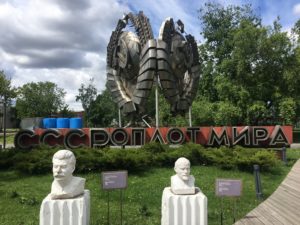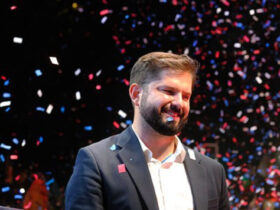
In January, two days before its slated release, the Ministry of Culture pulled the “The Death of Stalin,” a new film from Scottish director Armando Iannucci, from Russian theaters. The black comedy satirizing Stalin and his inner circle – including Georgy Zhukov, the Soviet marshal extolled for his role in defeating Hitler – in the infamous dictator’s final days would have struck an awkward chord, scheduled to hit theaters mere days before the 75th anniversary celebration of the Battle of Stalingrad. The film was banned on grounds of “extremism,” implying that it is “extreme” to cast celebrated national figures – Zhukov, but increasingly Stalin – as anything less than objects of reverence.
This is not the work of a slick and sophisticated propaganda machine, but the clumsy and heavy-handed gambit of a regime hell-bent on stamping out opposition. Perhaps even a regime in fear.
Putin may have won a landslide victory by most measures – incidentally marking the longest stay in power of a Russian leader since Stalin – but his government’s ever-heightening intolerance toward opposition speech hints at desperation lurking beneath the surface. This rising repression may be effective while the general population remains content, but it evokes the image of a ceiling of tolerance that might one day be hit–but with what consequences?
A return to a Stalinesque reign of terror today is unlikely, though not impossible. Obviously, the ideological platform on which totalitarianism was justified in the Soviet era no longer stands–today Russia positions itself against the debauchery of liberalism as a pillar of Orthodox morality and traditional values. Accordingly, Putin props up his power using an image of himself as guardian of ancient, sacred Mother Russia mixed with the strongman warlord who can stick it to the arrogant West.
Cast in this light, Putin likely does indeed enjoy overwhelming support in Russia – but any support based on suppression of even the idea of opposition is bound to wane sooner or later in an age when, as repeated hacks and leaks remind us, nothing hidden from the public can remain so for long. Of course, Putin’s precise support figures in Russia could be debated ad infinitum, given the opacity of the data and the inherent difficulty of quantifying individuals’ tangled web of inner lives. In fact, obtaining a percentage of support for Putin is both a futile and an absurd project. Focusing on fluctuating figures drawn from flawed studies misses the wider picture–the meaning and the means of Putin’s support.
What is clear, however, is that any support built on overt and graceless suppression of facts, alternate narratives and viable political alternatives might not take as much to topple as Putin’s apparent monopoly of power in Russia might suggest. Let’s not forget that a driving force of opposition to the Communist regime among the Russian youth – and perhaps the most immediately striking difference reported by those who escaped from behind the Iron Curtain into the capitalist countries – was the suffocating grasp that the Party maintained on the production and circulation of culture, art and ideas, contrasted with the cliched but palpable sense of freedom in the West. But what was necessary for the survival of the Soviet regime – strangling all alternate narratives – is no longer possible in a digital age. As the Russians themselves demonstrated in 2016, in today’s world, secrecy and censorship can only be conditional and temporary.
Let’s also not forget that Putin, like Stalin, is a mere mortal. By highlighting the great dictator’s very humanity in depicting the moment of death in its naked, absurd universality, “The Death of Stalin” poses an existential threat, not merely a political one, to Putin’s regime. Turning into art the notion that every ruler, no matter how totally sublimated into national myth, remains a man who will one day meet an end that is equal parts tragic, comic and banal is enough to make the ground quake under Putin’s project–namely, maintaining his grasp on power by mythologizing himself to the point where he is synonymous with the Russian nation in all its glory.
If this view of Putin is widespread enough to serve as a useful generalization in the country, it is completely beside the point to speak of a public opinion that supports Putin (for there is no public opinion where there is no public–no citizens, only subjects). Supporting Putin is not an active choice but a passive acceptance of an existential truth–but one that was at one point constructed, and one that must be maintained scrupulously–and unscrupulously. As the banning of the “Death of Stalin” suggests, it is one that might be slowly eroding in the deep caverns of national consciousness. To close with another cliché, desperate times call for desperate measures.
Correction March 31: An earlier version misspelled Georgy Zhukov’s first name as Gregory.
The views expressed by the author do not necessarily reflect those of the Glimpse from the Globe staff, editors or governors.







